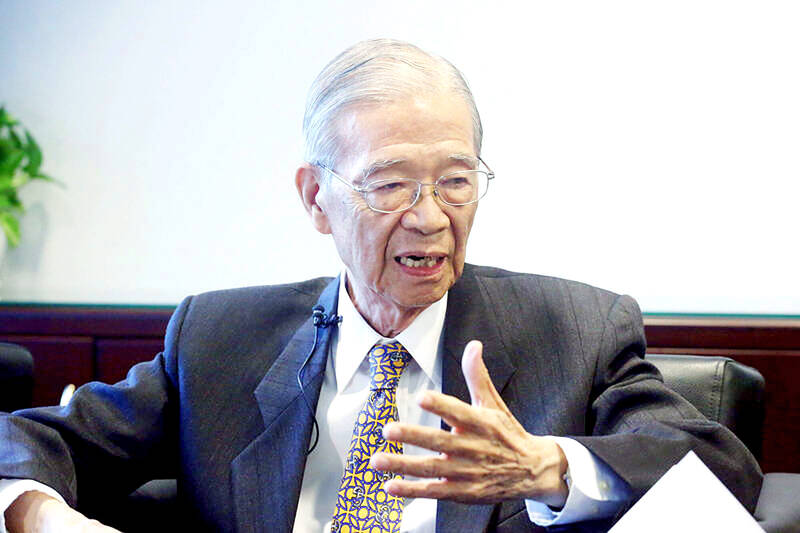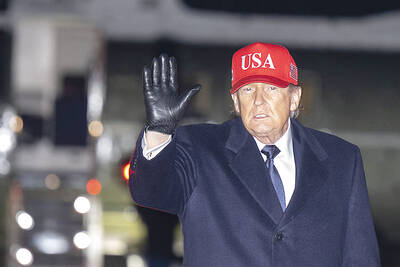Former National Security Council (NSC) secretary-general Ting Mao-shih (丁懋時), who played a crucial role during the Third Taiwan Strait Crisis in 1996, passed away on Tuesday at the age of 99, an unnamed diplomatic source told the Central News Agency.
Ting died at Cheng Hsin General Hospital in Taipei, the source said on condition of anonymity, as he was not authorized to talk publicly about Ting’s death.
Born on Oct. 10, 1925, in China’s Binchuan County, Yunnan Province, Ting served as Taiwan’s top diplomat from 1987 to 1988 and later as representative to the US. His previous overseas posts also included being a top envoy to South Korea, Rwanda and Zaire.

Photo: CNA
In May 1996, while serving as NSC secretary-general under then-president Lee Teng-hui (李登輝), Ting traveled to New York to engage in high-level talks with then-US deputy national security adviser James Steinberg amid the Third Taiwan Strait Crisis.
The crisis refers to a series of missile tests China conducted in waters surrounding Taiwan in July 1995 following Lee’s visit to the US and in 1996, ahead of Taiwan’s first direct presidential election, to warn Lee against attempts to build closer ties with the US and to pressure Taiwanese not to elect him.
The meeting was the first between high-level US and Taiwan security officials since official relations were severed in 1979. It established a platform for meetings between Washington’s and Taipei’s national security agencies despite the lack of official diplomatic relations.
Ting also met then-Japanese chief Cabinet secretary Seiroku Kajiyama in May 1996 to discuss the cross-strait situation and share intelligence, marking the first time a top Taiwanese national security official visited Japan since both sides cut diplomatic ties in 1972.
The US later sent the USS Nimitz aircraft carrier strike group through the Taiwan Strait, which was then the biggest US military armada in Asia since the end of the Vietnam War. That strong showing of support for Taiwan reportedly forced China to end its military exercises in the Taiwan Strait.

Taiwan has received more than US$70 million in royalties as of the end of last year from developing the F-16V jet as countries worldwide purchase or upgrade to this popular model, government and military officials said on Saturday. Taiwan funded the development of the F-16V jet and ended up the sole investor as other countries withdrew from the program. Now the F-16V is increasingly popular and countries must pay Taiwan a percentage in royalties when they purchase new F-16V aircraft or upgrade older F-16 models. The next five years are expected to be the peak for these royalties, with Taiwan potentially earning

STAY IN YOUR LANE: As the US and Israel attack Iran, the ministry has warned China not to overstep by including Taiwanese citizens in its evacuation orders The Ministry of Foreign Affairs (MOFA) yesterday rebuked a statement by China’s embassy in Israel that it would evacuate Taiwanese holders of Chinese travel documents from Israel amid the latter’s escalating conflict with Iran. Tensions have risen across the Middle East in the wake of US and Israeli airstrikes on Iran beginning Saturday. China subsequently issued an evacuation notice for its citizens. In a news release, the Chinese embassy in Israel said holders of “Taiwan compatriot permits (台胞證)” issued to Taiwanese nationals by Chinese authorities for travel to China — could register for evacuation to Egypt. In Taipei, the ministry yesterday said Taiwan

‘LIKE-MINDED PARTNER’: Tako van Popta said it would be inappropriate to delay signing the deal with Taiwan because of China, adding he would promote the issue Canadian senators have stressed Taiwan’s importance for international trade and expressed enthusiasm for ensuring the Taiwan-Canada trade cooperation framework agreement is implemented this year. Representative to Canada Harry Tseng (曾厚仁) in an interview with the Central News Agency (CNA) said he was increasingly uneasy about Ottawa’s delays in signing the agreement, especially as Ottawa has warmed toward Beijing. There are “no negotiations left. Not only [is it] initialed, we have three versions of the text ready: English, French and Mandarin,” Tseng said. “That tells you how close we are to the final signature.” Tseng said that he hoped Canadian Prime Minister Mark Carney

The US’ joint strikes with Israel on Iran dismantled a key pillar of China’s regional strategy, removing an important piece in Beijing’s potential Taiwan Strait scenario, said Zineb Riboua, a senior researcher at the Hudson Institute’s Center for Middle East Peace and Security. In an article titled: “The Iran Question Is All About China,” Riboua said that understanding the Iran issue in the context of China’s “grand strategy” is essential to fully grasp the complexity of the situation. Beijing has spent billions of dollars over the years turning Iran into a “structural strategic asset,” diverting US military resources in the